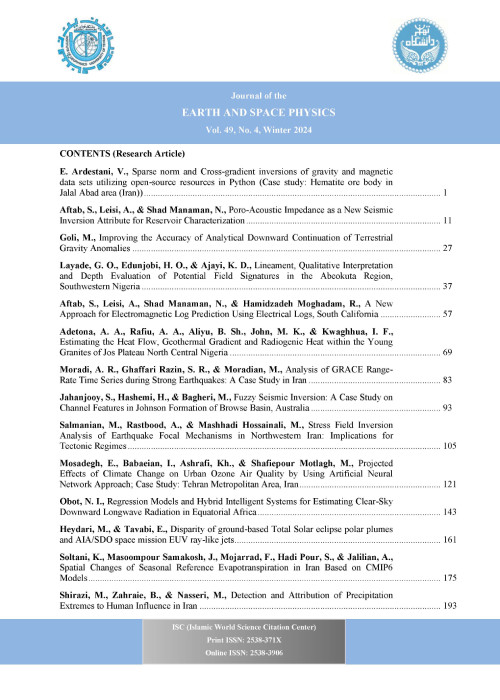A laboratory study of the role of ions in warm cloud formation
Author(s):
Abstract:
Aerosol formation due to ions in the atmosphere is not well understood, although it seems to play an important role in cloud formation. The ions in the atmosphere can enhance cloud formation and can increase nucleation as well as impeding the evaporation from the surfaces of the droplets. Recently there has been some experimental work to find the relation between ions concentrations and cloud initiation. Experimental and field studies show that the classical nucleation theory cannot explain the formation of the aerosols at their early stages formation. Although some ideas have been given concerning this problem, e.g. ion-induced nucleation (Arnold 1980; Raes et al. 1986; Turco et al. 1998) and ternary nucleation (Kulmala et al. 2000). The experimental considerations of the role of aerosol formation by ions are also not wide spread, particularly those that can be applicable to the lower atmosphere. Along this line, we have studied this problem in the warm cloud in the laboratory. By warm cloud we mean that the experiments were carried out at room temperature. In these experiments the role of ions in warm cloud formations is studied in a cloud chamber of 20 liters in the laboratory. Ions were produced by a strong electric field in the chamber. The ion concentration is controlled by the time of ionization of air between two electrodes. The cloud concentration was also measured by the attenuation of a laser beam going through the cloud chamber. With cloud formation the opacity of the chamber was changed, so that with the increase of cloud concentration due the scattering of laser light by cloud droplets less light reached the detector, resulting in smaller laser signal. The laboratory facility for this study includes a cloud chamber, a laser beam (red with 598 nm) with a detector, signal amplifier, pressure gauge (water column manometer), temperature and humidity sensors of which their signals are digitized using a computer with an Analogue to Digital convertor, with typical sampling time of 0.5 of second. Cloud concentration is determined by fluctuations in the laser signal. Some 25 experiments were carried out with different ions concentrations. The warm cloud in the chamber was produced by an adiabatic the expansion of nearly saturated moist air. As soon as the expansion starts the cloud forms, although it takes a few 10s of seconds to clear off. The clearing times also seems to be dependent on the size of the cloud droplets, as they precipitate differently due to gravity. In this paper we report the results of experiments concerning ions with different concentration in the cloud chamber. Preliminary results show that as the ion concentration increases to some level the cloud formation is enhanced. But as the ion concentration increases more than a certain (optimum) value the cloud formation is hampered and we acquire less cloud with perceptible droplet sizes. We found that the over seeding process occurs as a result of increasing ion concentration more than the optimum value leading to less perceptible cloud. This leads to an increase of cloud clearing time after an optimum point.
Keywords:
Language:
Persian
Published:
Journal of the Earth and Space Physics, Volume:39 Issue: 4, 2014
Pages:
123 to 134
magiran.com/p1225665
دانلود و مطالعه متن این مقاله با یکی از روشهای زیر امکان پذیر است:
اشتراک شخصی
با عضویت و پرداخت آنلاین حق اشتراک یکساله به مبلغ 1,390,000ريال میتوانید 70 عنوان مطلب دانلود کنید!
اشتراک سازمانی
به کتابخانه دانشگاه یا محل کار خود پیشنهاد کنید تا اشتراک سازمانی این پایگاه را برای دسترسی نامحدود همه کاربران به متن مطالب تهیه نمایند!
توجه!
- حق عضویت دریافتی صرف حمایت از نشریات عضو و نگهداری، تکمیل و توسعه مگیران میشود.
- پرداخت حق اشتراک و دانلود مقالات اجازه بازنشر آن در سایر رسانههای چاپی و دیجیتال را به کاربر نمیدهد.
In order to view content subscription is required
Personal subscription
Subscribe magiran.com for 70 € euros via PayPal and download 70 articles during a year.
Organization subscription
Please contact us to subscribe your university or library for unlimited access!



